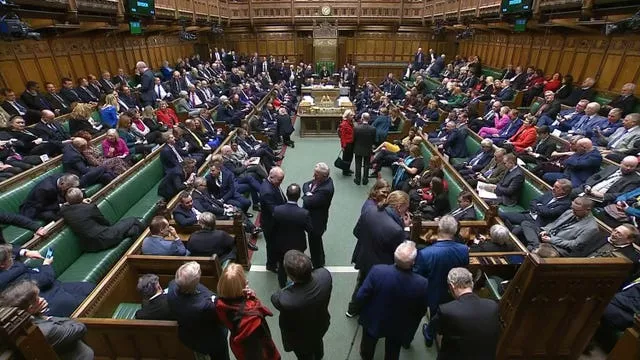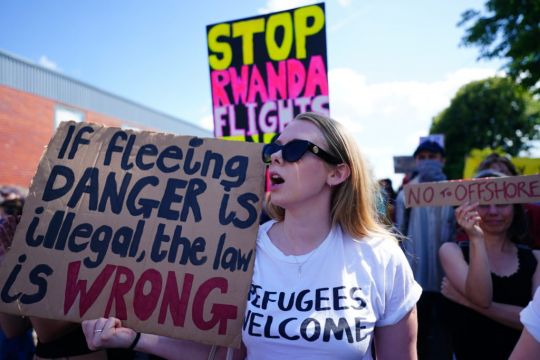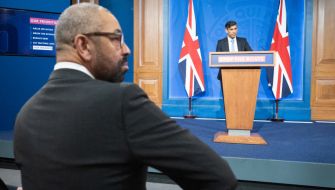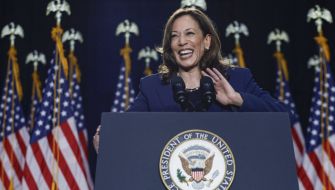UK prime minister Rishi Sunak has seen off a rebellion by his own MPs over the Rwanda Bill, but he faces significant challenges ahead as he seeks to ensure the removal of migrants can begin, with the aim of creating a deterrent to small boat crossings.
The emergency legislation survived a vote at second reading after a frantic day of talks with potential Tory rebels aimed at avoiding a full-blown Government crisis.
However, the Bill’s contents remain highly contentious, meaning the legislation is virtually guaranteed to face a rocky ride through the UK parliament in the new year.
What happened before the vote on the Safety of Rwanda (Asylum and Immigration) Bill and what was the outcome?

Ahead of the vote, MPs on the Tory right continued to insist they could not support the Bill in its current form as it left too much room for legal challenges to migrants being removed to Rwanda.
Meanwhile, Tory centrists in the One Nation caucus agreed to support the Bill but warned they would oppose future amendments that would breach the rule of law and the UK’s international obligations.
After an intense day in Westminster amid speculation that a government defeat would threaten Mr Sunak’s position, when push came to shove no Conservative MP voted against the Bill.
With 29 MPs on the Tory right abstaining from voting, the UK government secured a comfortable majority of 44 – with 313 in favour and 270 opposed.
What happens to the Bill next?

The Bill will now go to committee stage on a date in the new year that is yet to be confirmed.
The UK government has said the Bill will be considered by the whole house, rather than by a dedicated public bill committee, allowing all MPs to take part in the debate and vote.
The legislation is then due to be considered at third reading before being passed to the House of Lords.
How are MPs on the Tory right expected to respond?

It is safe to say the groups of MPs who want the Bill to take a harder line that stresses the sovereignty of parliament over certain legal process will now, as happened during the crisis surrounding the implementation of Brexit, feel emboldened.
With the threat of a defeat that could have potentially disastrous consequences for the UK government still hanging over the process, hardliners will now expect ministers to respond to their show of strength with amendments that fully address their concerns.
Mr Sunak’s authority has clearly taken a blow, and it still remains to be seen how he will navigate a complicated and perilous route to a satisfactory outcome.
A key flashpoint currently looks likely to be Mr Sunak’s continued insistence that any changes must be consistent with the government’s legal advice, as well as the “current framework” of the bill.
It is not clear how he will reconcile this stance with the level of tightening demanded by the Bill’s critics, who appear primed to inflict a defeat on the Government at the third reading if they do not get their way.
One Tory rebel said: “This Bill has been allowed to live another day.
“But without amendments it will be killed next month. It is now up to the government to decide what it wants to do.”
How will more moderate Tories respond?

The One Nation caucus has demonstrated its reputation for what is considered a more level-headed and pragmatic approach to issues by voting with the government.
However, the influence and size of the grouping, which is about 100 MPs, means it would be perilous for ministers to make assumptions about their intentions as they play a central role in the future of the legislation and, perhaps, Mr Sunak.
Damien Green, former de facto deputy prime minister and chair of the group, suggested his colleagues are up for a fight if there are attempts to change the legislation.
While some moderates will already be uneasy with the Bill due to its potential implications for human rights and treaty obligations, they currently appear united by a determination to prevent manoeuvres on the right of the party, causing the government to collapse.
But there are now questions over whether this position will hold into the new year, particularly if ministers begin to imply there will be concessions to those who take a different stance.
What will happen when the Bill is sent to the House of Lords?

There is an expectation that if the Bill survives the House of Commons, it will face heavy scrutiny in the UK's House of Lords.
There are no special procedures to pass emergency legislation. However, in normal circumstances the Lords will agree to pass an emergency Bill quite quickly.
It remains to be seen whether this will be the case with such a contentious piece of legislation and the Lords are under no obligation to do so.
So, as with any Bill, there will be opportunities for the Lords to delay or block the legislation.
The UK government does not have a majority in the Lords and there has been plenty of appetite for peers to make life difficult for ministers in recent years.
Data shows the government has been defeated in the Lords 360 times since the 2019 general election.

The profile and focus of the legislation suggests there could be significant concerns in the Upper House over its contents, which could lead to delays.
The UK government cannot control the timetable in the Lords and any amendments would have to be removed by the government as the Bill rebounds between the two Houses during the final “ping-pong” stages.
How has Labour responded?

Labour said the result of the vote meant the Tory “psychodrama” over tackling Channel crossings would “drag on” into 2024.
The party has also focused on costs, warning the Rwanda asylum scheme could cost £400 million and take more than 100 years to deport 15,000 people.
Shadow home secretary Yvette Cooper branded the proposal “extortionately expensive” as she questioned whether ministers have made further commitments beyond the cash already spent on the grounded scheme.
The Home Office confirmed £240 million has been paid to Rwanda so far with another payment of £50 million anticipated in 2024/25.







